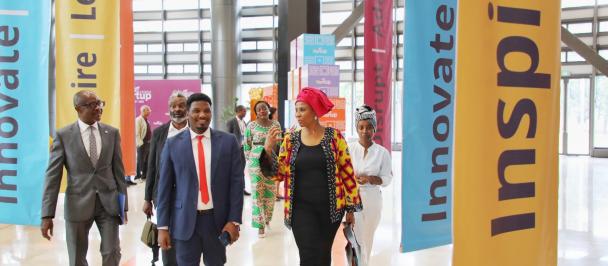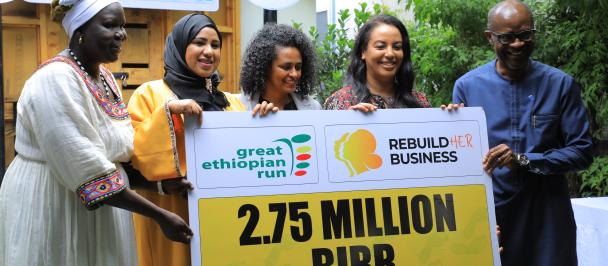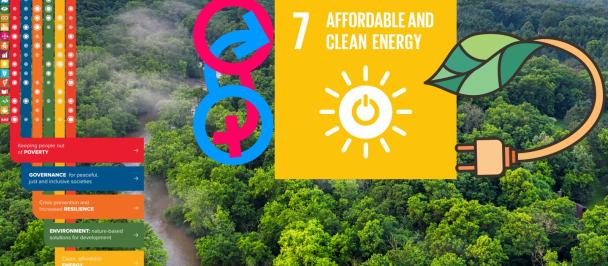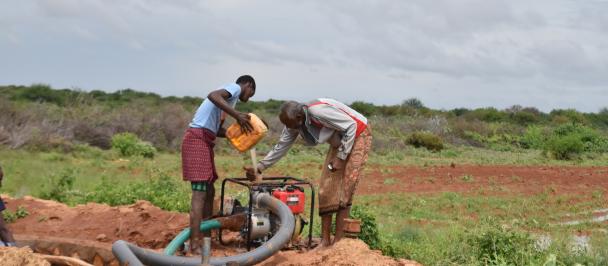By Wudasse Berhanu, Programme Analyst, UNDP Ethiopia
Crowdfunding: Learnings from UNDP Ethiopia's Rebuild Her Business Campaign
April 16, 2024
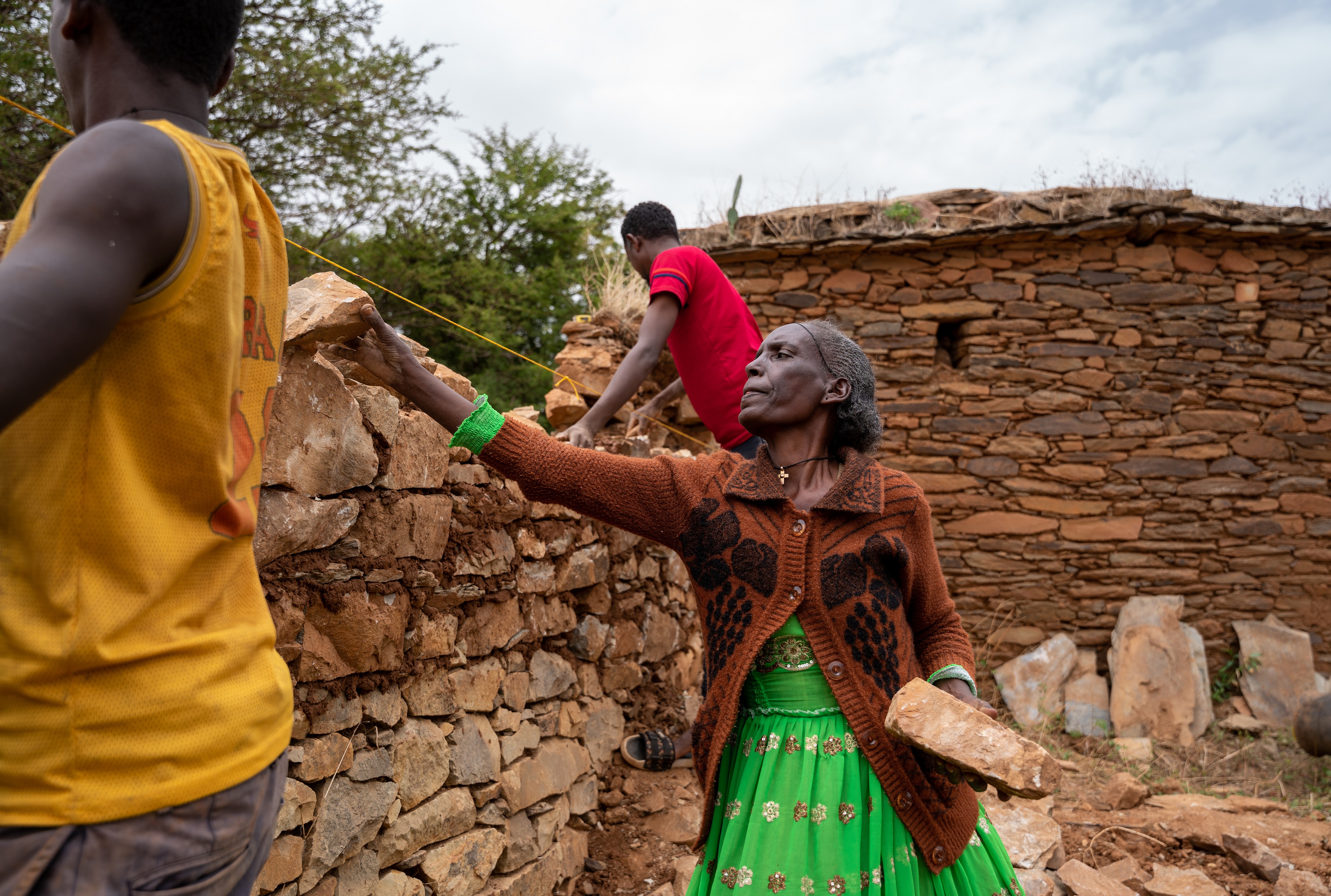
Atsabey in the Tigray region is rebuilding her fence
Six months ago, UNDP Ethiopia launched a Rebuild Her Business crowdfunding campaign to raise funds to support women in northern Ethiopia recover their businesses that were affected by the conflict. The campaign was designed as part of the multi-dimensional support aimed at establishing a foundation for recovery, peacebuilding, and sustainable development in northern Ethiopia.
The campaign was designed by the Ethiopia Accelerator Lab to experiment with and generate knowledge on crowdfunding as an alternative resource mobilization tool. The campaign raised $388, 922.27 over six months (August 2023 — February 2024) from individual contributors, corporations, and development partners. The campaign will be able to support 775 women in Northern Ethiopia to rebuild their businesses.
What did we learn?
Being the first crowdfunding campaign for the country office, there were a lot of learning curves to navigate both internal and external. While UNDP has been using crowdfunding through the Alternative Finance Lab since 2021, there are various levels of understanding and use in different country offices. In Ethiopia, we had to work in collaboration with various teams to lean about the technicalities and procedures around crowdfunding as we are implementing the campaign.
In terms of external considerations, while we were working on a campaign that was timely given the country’s post crisis context, there was also a lot of sensitivity as it related to conflict. This sensitivity prompted us to be cautious in our approach and consider how we implement the campaign. Below are some key lessons we have had leading the crowdfunding campaign.
Build a team
Crowdfunding is a team sport, and a strong multidisciplinary team needs to be behind the campaign to make it successful. Understanding this through our engagement with the Alternative Finance Hub, we established the crowdfunding team from key departments from the design of the campaign with communication, partnership development, procurement, and project teams. Engaging early allowed us to have repour with the team members and continuous support throughout the year-long process. Having the buy-in from senior management to experiment with the campaign was paramount as a lot of what we were trying was new to the country office.
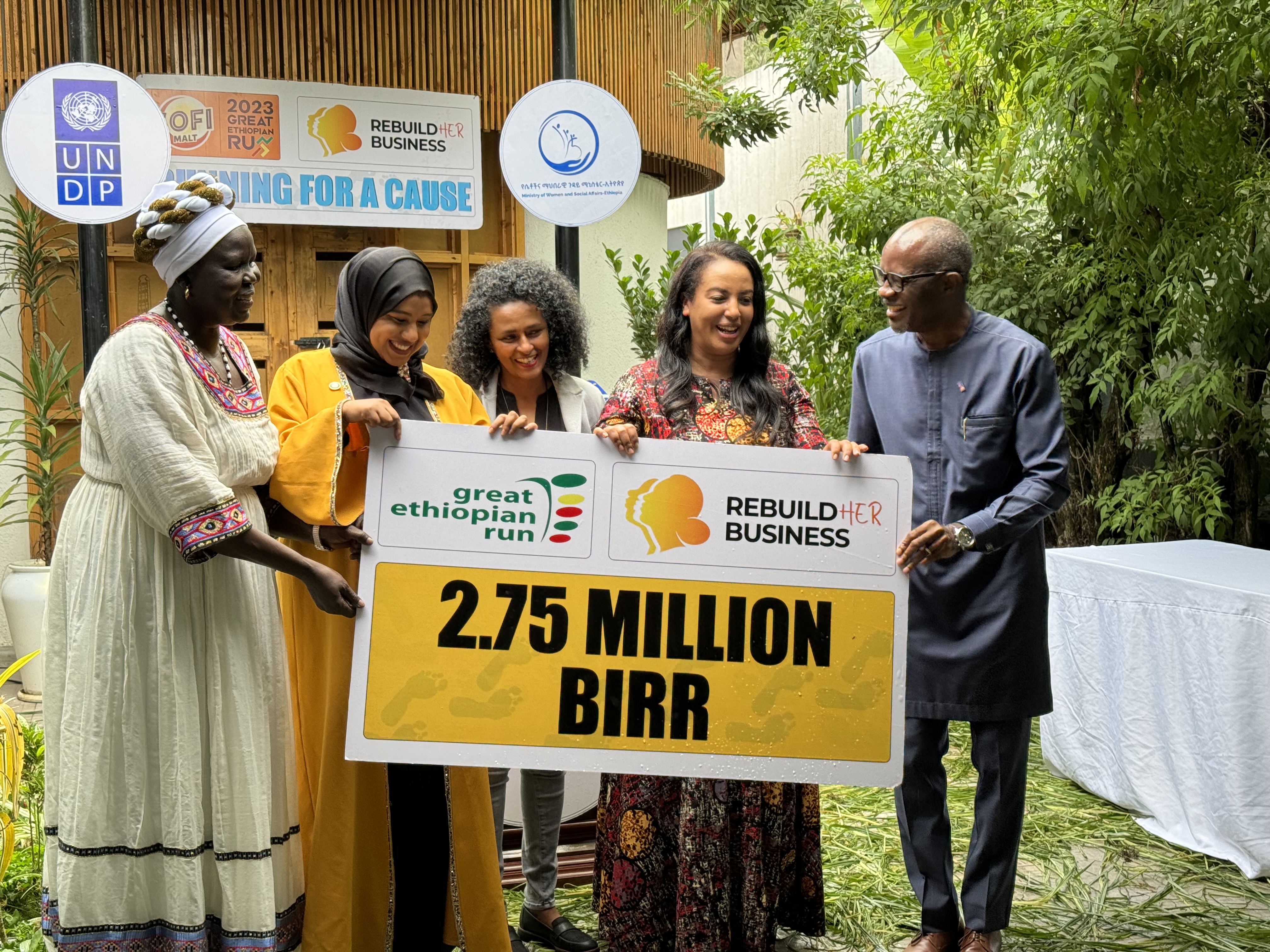
Great Ethiopia Run's General Manager Ms Dagmawit Amare (center) hands over funds raised for the campaign to UNDP Ethiopia's Resident Representative Mr Samuel G. Doe. Also in the picture are (left to right) State Minister Alemitu Umut (Women and Children's Affairs), State Minister Huria Ali Mahdi (Social Affairs), and Minister Ergogie Tesfaye (Ministry of Women and Social Affairs.
Partnership Development
One of the key success factors to this campaign was the type of partnership we were able to form with the private sector and foundations. Rather than have a UNDP-only campaign we opted to have a co-host, the Great Ethiopian Run (GER), as a local fundraiser to support the campaign and bring their expertise. This partnership also opened up the door to connecting the campaign with sports as a way to engage the communities in the cause through GER’s annual Run for a Cause initiative. This was a great opportunity to have an activity that people loved doing and introduce a cause that they could support in the process.
In addition, through this partnership, we were able to leverage key public figures such as the renowned Ethiopian athlete Major Haile Gebreselassie giving the campaign reliability and accessibility. Especially in the context of local fundraising, this was helpful to get by in and reduce the sensitivity of the topic.
Storytelling
Crowdfunding is about telling a compelling enough story for individuals to want to participate, so how well the story behind the Rebuild Her Business is communicated was important. Especially in our context it is easy to get lost in the “development talk” full of jargons creating an abstract systemic work that is important but hard to connect with for individuals.
So, for this campaign we were determined to have the stories of the women take center stage in a hopeful and dignified manner. We had to create a brand identity for the campaign through which we can share stories, visuals, and communications. The women we are trying to reach are far removed from our day to day lives so it was important to create a connection with the potential donors on an individual basis. As a result, we created a campaign video and collected stories from the three regions that are the voices of the women impacted by the conflict.
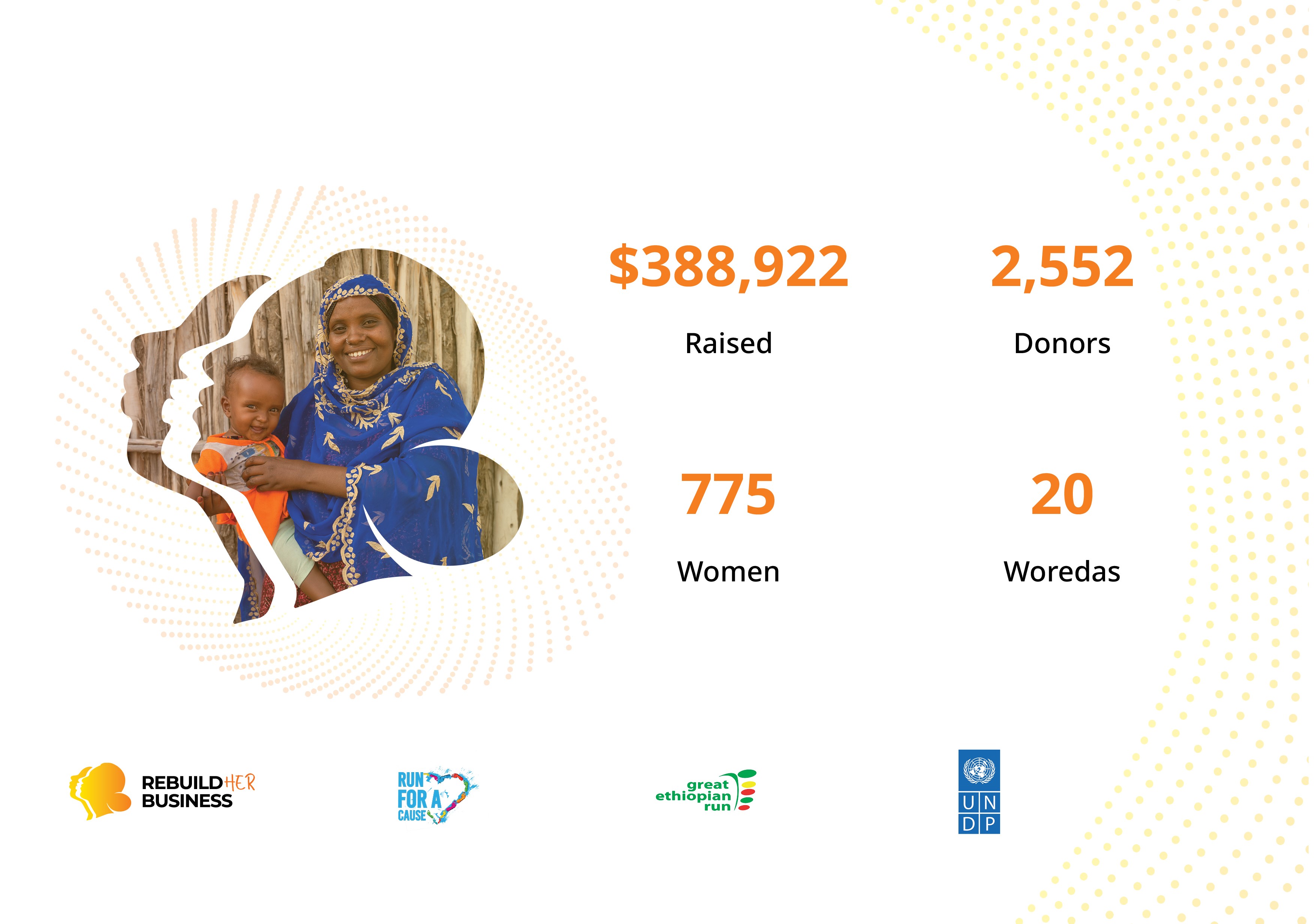
Platform of Choice
A key enabler for crowdfunding is the online platform. The choice of a platform is critical in creating a smooth donation journey because the more complicated the donation journey is, the more like a donor will fall off the process. Through UNDP’s global partnership, we had access to a fundraising platform however this was a challenge for us in Ethiopia as local payment methods (mobile money and banks) were not accepted on these platforms. Therefore, we needed to have a platform that can support local and international payments.
We worked with Chapa Financial Technologies to develop the crowdfunding platform for Rebuild Her Business. The startup company is one of the first payment processors in Ethiopia to accept both international and local payments online. However, this raised another issue where international banks and cards would decline some transactions because payments were originating in Ethiopia which was out of the ordinary for the donors. These technical challenges were addressed throughout the process but presented challenges that we did not anticipate in the beginning. Therefore, selecting a suitable platform especially in emerging digital markets like Ethiopia needs to be given a lot of consideration.
Crowdfunding as UNDP
Another factor in our fundraising journey was the local perception of UNDP. As part of the UN system supported by development partners, there is a perception that UNDP is gives funds not a collect them This perception was quite hard to get over and another reason that promoted us to have a campaign with significant partnerships. With our traditional partners, we could leverage UNDP’s operational capacity, our long-term development portfolios, and partnership with the government for contributions to our projects. For individuals however, these things didn’t matter. They were far more interested in a tangible impact that is immediate and assurance that the funds would reach the intended women no matter what.
Our strategy to address this was to create a campaign that was straight forward, $500 dollars capital funds for 1000 women to recover their business after a conflict. The project was providing psychosocial and business development training programs, but these were far too abstract and intangible in terms of visual impact to be of consequence in raising funds. So, we were covering these activities through internal funds and putting out the tangible activities for crowdfunding.
Secondly, we had to show what UNDP’s input was to this campaign, that we weren’t coming empty handed to collect money but also contributing. We did this by covering all administrative and operational costs of this activity so that all the funds that were raised would go directly to the women in need. This was of particular interest for the private sector and the foundations as they were more interested in reaching the women in need and not paying the costs that are incurred along the way.
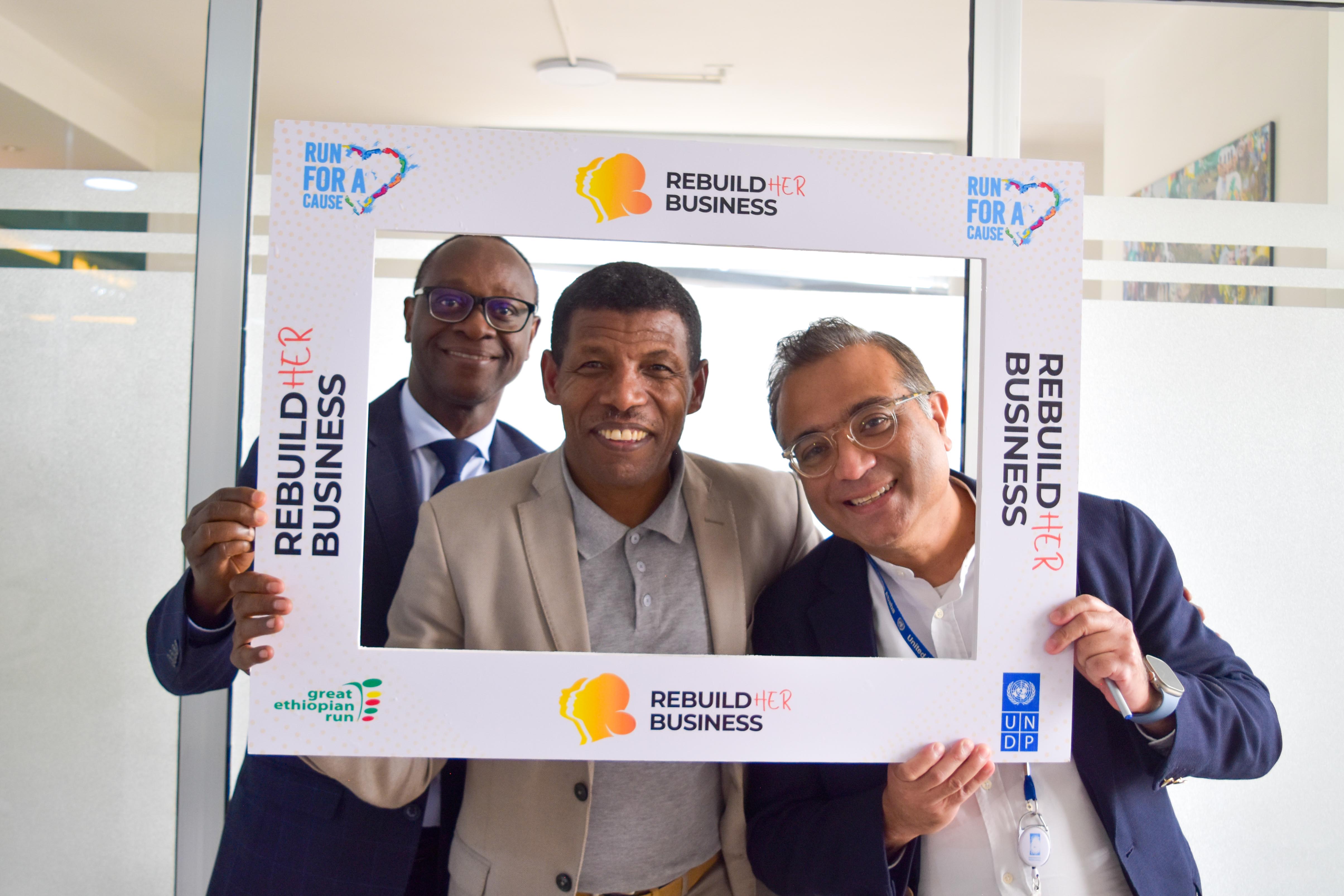
Left to right : UNFPA Representative Mr Koffi Kouame with Major Haile Gebreselassie and former UNDP Ethiopia Resident Representative Mr Turhan Saleh
What is next
Over the past four years, we have been talking a lot about what scaling means for the accelerator labs, I believe this is a great example of how the lab can support a project to achieve a specific goal through experimentation and handover for implementation. After the collection of raised funds, the Peace support team is working with the relevant offices in the 20 woredas to select the women and provide the $500 capital funds. of the first phase of the crowdfunding campaign,
Seeing the unfortunate need, the crowdfunding campaign is addressing and the need for alternative financing as global and national priorities change, and resources become stretched, there is growing interest from UNDP and the government counterparts to grow the Rebuild Her Business campaign to a national level business recovery fund for women business in crisis. We can prompt us to explore further financing tools for business such as green financing. We are facilitating this discussion and looking at engaging other partners to launch a nationwide Rebuild Her Business campaign.

 Locations
Locations